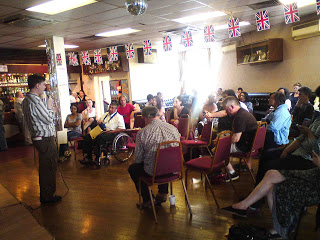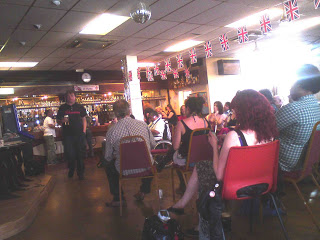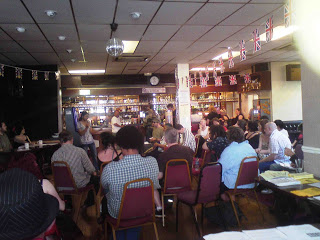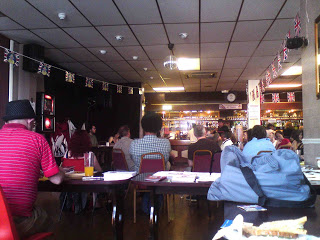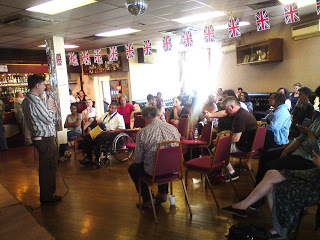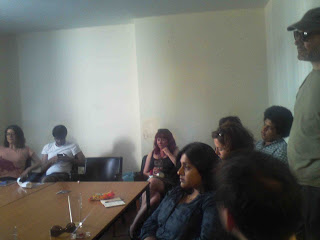 |
| workshop |
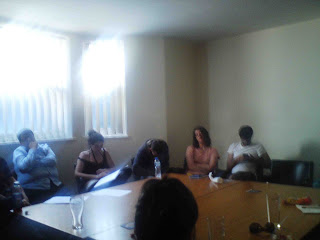 |
| ONE OF THE WORKSHOPS |
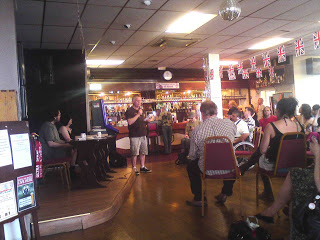 |
| Andy Richards – Chair of Brighton & Hove LG UNISON |
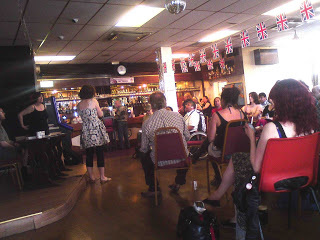 |
| Pip speaking from BBC |
The Queens and Buckingham Palace Also Use Workfare
June 3, 2012
Cross post from Brighton Benefits Campaign
On Saturday 26 May, nearly fifty anti-workfare activists met up in Brighton for a national conference entitled ‘How do we break workfare?’
Participants came from Liverpool, Norfolk, Oxford, Dorset, London, Surrey and Sussex as well as Brighton and Hove. They represented welfare and anti-cuts campaigns, claimant organisations, political groups and trade unions, as well as many individuals opposed to workfare. 1
Despite a late start because of transport delays, a massive amount of hard work was done, and decisions made which will hopefully enable us to successfully fight workfare in all its guises.
The conference was always envisaged as totally participatory – a means for all of us, whether representing groups or not, to contribute our expertise, experience and ideas in making plans for a comprehensive, national campaign against workfare – so speeches were kept to a minimum.
Welcoming everyone to the conference, Paul from Brighton Benefits Campaign read out a message of support from Caroline Lucas MP. Pip from BBC then gave a short description of their own workfare campaigning since the days of the Flexible New Deal, and explained how the conference had come about. Andy Richards, chair of Brighton & Hove Unison, spoke about the effect of workfare on those in work, & the need for trade unions to organise against it. Finally Maj from Brighton SolFed described the five workfare schemes and the current situation. 2
Discussion was then open to the floor and covered all aspects of workfare, including a lively debate about whether campaigning should be ‘political’ or not, which turned mainly on the definition of the word, but revealed a deep distrust of party-based politics among those representing claimant groups. It also highlighted the difference between Brighton Benefits Campaign and other campaigns which are issue driven and draw in mainly those affected by the issue – in this case workfare. 3
Workshops on claimant rights and involvement, trade unions, and labour market reconstruction were held in the morning, providing a chance to share experiences, expertise and ideas. After a break for food and networking, action groups focussed on planning activity and building the campaign to break workfare in four main areas – direct action, trade unions, claimant action and publicity/education.
Notes and questions raised and suggestions for further action from both workshops and action groups were then fed back and discussed at the final plenary.
Trade Unions (both sessions)
notes & questions:
– TUC workfare policy is ambiguous & response from TU leaders patchy
– how do you challenge leadership if they are not performing?
– role of trades councils is crucial to exert pressure on trade union leaders
Trade Union suggestions:
– oppose all unpaid work, whether voluntary or not
– educate unions to recognise workfare, publicise facts
– direct union branches to the Boycott Workfare pledge, raise motion
– emphasise it is in the interests of all workers to oppose workfare
– build understanding between trade unions and campaigns
– display trade union banners prominently on demonstrations
– encourage union membership, take leaflets on pickets
– communicate with workers when taking action against their employer
– fight for a living wage
– call for the CWU to pull out of workfare altogether
Claimants Rights (workshop) Claimant Action Group
notes & questions:
– consent can be withheld
– how can sanctions can be fought?
– how can the unemployed be organised to campaign?
– very important to empower individuals by informing them of their rights
Claimant Action suggestions:
– set up an unemployed workers’ union
– design a leaflet to hand out at Jobcentres
– publicise rights information to enable refusal to comply 4
– raise the issue of risk associated with the different schemes
Direct Action Group
Direct Action suggestions:
– National Week of Action from July 7-14
– continue pickets & communication blockade of Holland & Barrett
Publicity & Education group
notes & questions:
– confidence building is important – more coordinated national action needed
– how can we organise national responses to media etc?
Publicity/Education suggestions:
– use the term ‘job destruction’ for workfare
– research companies to name and shame them
– utilise fly posting and stickers to identify and shame companies
– organise local training to build confidence in communicating
– make the campaign country wide
– create a national website for resources, also news, info etc
– create a national committee to represent all groups
There was some debate at the plenary over whether the national representative body should be a committee or a more informal forum, with concerns raised about the possibility of take over by unions supporting workfare or other groups. However as all those affiliating to the national organisation would have to be committed to opposing workfare this seemed unlikely. Also informal forums can be very undemocratic.
Following discussion the conference agreed by an overwhelming majority:
To establish a national campaign under the name Boycott Workfare, to which groups and trade union branches can affiliate, and a national website to which groups have access.
To set up a committee/forum representing all the affiliated organisations which will meet by Skype on a regular basis, and once a year in person. The first Skype conference to be held on Thursday 7th June at 7.30pm.
To announce and organise a National Week of Action from July 7th to 14th. This will include pickets and a communication blockade of Holland & Barrett to escalate the campaign to get them to break with workfare altogether.
To support a counter conference during the Welfare to Work Convention in Birmingham on Tuesday 10th and Wednesday 11th July.
To send a letter to the CWU, with a copy to the TUC, condemning its use of workfare. Tony Greenstein will draft and circulate. The other most culpable unions such as USDAW and Unison to be contacted informing them of the letter.
Our thanks to all who came to the conference, put in so much effort, and made it such a great day. It was brilliant to meet up with everyone and be part of this growing movement.
1 Organisations represented at the conference:
ALARM
Anarchist Federation
Bournemouth & Poole Anti-Cuts Coalition
Boycott Workfare
Brighton & Hove Trades Council
Brighton & Hove TUC Unemployed Workers Centre
Brighton & Hove Women Against Cuts
Brighton Benefits Campaign
Brighton Stop the Cuts Coalition
Consent.me.uk
CWU
Disabled People Against Cuts
Hastings Against the Cuts
Job Seekers Alliance
Kingston Anti-Cuts
Lambeth Save Our Services
NUJ
NUS
NUT
Oxford Save Our Services
Right to Work
RMT
Socialist Party
Socialist Workers Party
Solidarity Federation
The Commune
UCLU
Unison
Unite
2 Further details on the five kinds of workfare at SolFed factsheet
3 Brighton Benefits Campaign takes the position that benefit cuts, and the cutting and privatisation of public services, are part of an all out class-based assault by the privileged on the rest of us. This assault has to be opposed by all of us, whether or not we are on benefits. Workfare is a major part of the assault and needs to be fought against by those in work and those out of it alike. This is a political view. However although we are happy to work with political groups and organisations who are part of that fight , BBC is not, and has no intention of being, affiliated to any political party or front organisation.
4 Information on rights and consent at
Queen’s Jubilee staffed with workfare
 |
|
| Photo: jimmyharris / flickr |
Posted: June 3rd, 2012
Boycott Workfare can now confirm that to Buckingham Palace’s shame, the Jubilee celebrations are currently using workfare to cut down on the staffing costs of security and stewarding at the event.
Whilst most people are either being paid to work today or enjoying having the day off, those on workfare are not so fortunate: they are carrying out a 16 hour shift in security and stewarding roles for the jubilee. The full shocking story can be read here.
Those familiar with workfare will be unsurprised by the details, with providers promising people training and wages, but then failing to deliver on both. If ever there was an example of what workfare is, and the inequalities it creates, then surely this is it.

